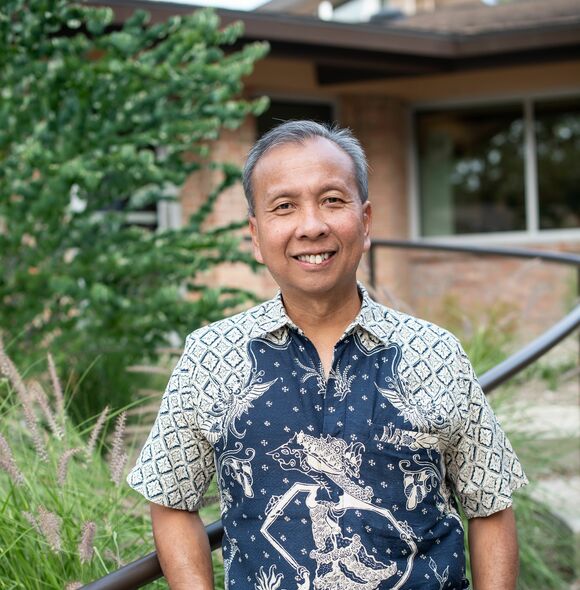Reading Scripture in the Country with the Largest Muslim Population in the World

Published by Yudha Thianto
Chief Academic Officer, Professor of History of Christianity and Reformed Theology
“Your Word is a lamp for my feet; a light on my path, Psalm 119:105,” I said clearly and confidently as I stood in front of the students, teachers, and staff of my entire school while holding a lit tapered candle. This Bible verse and how my teacher explained its meaning to the students at school that day shaped the way I read the Bible for the rest of my life. I was in second grade and living in Indonesia.
As minorities in the country with the largest Muslim population in the world, Christians face challenges every day. While the country’s constitution ensures the freedom to practice religion, in reality, it has not always been simple. Being surrounded by Muslim neighbors makes me— and other Christians in the country—fully aware that we are called to bring the truth of the Bible wherever we go.
Most Indonesian Christians recognize that some Bible stories resemble those in the Quran. There are people in the Bible who are also mentioned in the Quran: Adam, Abraham (who the Muslims call Ibrahim), Ishmael, Moses, David, Solomon, Jonah, and even Jesus are among them. The difference is that whereas the Bible provides fuller pictures and stories that build toward the history of redemption in Jesus Christ, the Quran often mentions these names in fragmental sayings that do not clarify the whole story or teachings. Understanding this difference becomes my entryway to share the light of God’s word in the Bible with my Muslim friends and neighbors who are willing or eager to know. Using the similarities as a starting point, I often find myself discussing or explaining the significance of the biblical people to them. In each encounter, I start by asking what they know based on their reading of the Quran. And when they find it hard to explain the depth of the significance of these people in what they believe, I broaden their understanding by telling the fuller story from the Bible.
My favorite Quran book or surah, meaning letter, is Surah Maryam, or “The Letter of Mary.” It is Surah 19 in the Quran. It resembles the first chapter of the Gospel of Luke. The surah opens with the story of Zechariah, a pious elderly man who cries out to God because his wife is barren. He asks God to give him a son. An angel then visits him, announcing that his wife will bear a son and that he will name him John (Quran 19:7). When Zechariah asks for a sign, the angel tells him that he will not be able to speak for three days. With that, he becomes mute. When his son is born, Zechariah, already able to speak again, names him John. When John is born, God speaks, saying that John is a righteous man (Quran 19:14-19).
Then, the story in the Quran switches to that of Mary, a young woman who leaves her family to go East. There, she is visited by the angel Gabriel (Quran 19:17). The angel announces that she will have a son. In her bewilderment, Mary asks him how this can be, considering she is still a virgin. Gabriel replies that what may seem difficult for humans is easy for God. He will make Jesus a sign for humanity and a mercy from him because he has already decreed it (Quran 19:21). In her labor pain, Mary experiences a miracle. God provides a stream of flowing water under her feet (a reminder of the story of Hagar and Ishmael in Gen 21:19) and ripe dates from a palm tree. Later in the surah, we read that Mary returns to her family, only to be misunderstood by her brothers for committing adultery and bearing a son out of wedlock. At this point, the Quran identifies Mary as the sister of Aaron (Quran 19:28). We see here that the Quran does not distinguish between Mary, the mother of Jesus in the Gospel of Luke, and Miriam, the sister of Moses and Aaron (Ex 15:20).
I often use Surah 19 to teach my students in Indonesia and the U.S. how to engage our Muslim neighbors and friends. The Quran carries some echoes of the Bible’s testimonies. Our task is to turn the echo back to its source in the Bible. This is how we can bring the light of God’s Word into the lives of the people around us.
For Indonesian Christians, understanding the Bible well is foundational not just for our walk as followers of Jesus Christ but also for witnessing our Muslim neighbors. Living in a country where being a Christian, at the very least, means that most people see us as less than equal or, in more challenging situations, considered a threat in need of suppression. Carrying out the message of the Bible and ensuring that the words guide our life is a real everyday challenge. In Indonesia, whether I teach in a seminary classroom, preach a Sunday sermon, lead a Bible study group, or speak to people informally, I couple my biblical knowledge with an awareness of how I can reach those interested in knowing more of the message of the Bible based on what they have learned in their own religious context.
Share
Visit Calvin Theological Seminary’s Campus
We can’t wait to host you on campus! Schedule your visit today, or, if you need more time to find a date that works for you, please request information so we can continue the conversation about supporting your calling!
